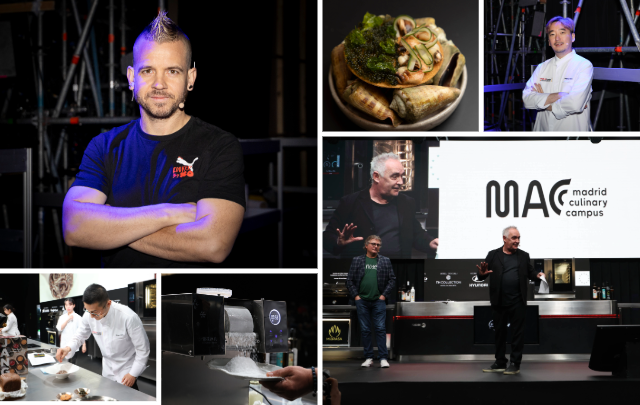News
Three generations of chefs embrace with enthusiasm on the second day of Madrid Fusión

The second day of Madrid Fusión Food from Spain has shown that the collaboration between different generations of chefs is a fruitful reality, generating synergies in which experience and youth join forces to guarantee the future of gastronomy. From the great universal references, such as Ferran Adrià or Gastón Acurio, to the generation that continued the gastronomic revolution with names such as Dabiz Muñoz, Ángel León, Andoni L. Aduriz, Ricard Camarena or Joan Roca, to the new names that are now shining on the current culinary scene - Dabiz Muñoz, Diego Oka, Mingoo Kang or Yasuhiro Tomari, among others - they have all demonstrated perfect harmony on and off the stage.
Madrid Fusión continued its focus on water, tradition, innovation, and creativity on the second day, when Ricard Camarena received the Madrid Fusión Alimentos de España Award for the Defence of the Product by the Minister of Agriculture, Luis Planas. At the same time, ICEX Spain Export and Investment, presented the fourth annual report on the foodtech sector in Spain, as part of the new Dreams space #spainfoodtechnation, which shows that the sector is one of the most dynamic, with 420 registered start-ups, among which those specialising in agritech and machine learning are growing. Taste as a goal, with its science and origins, and food technology, were also part of the second day of Dreams, which began with traditional alternative proteins such as rabbit and lamb, followed by the umami of Korean chef Junghyun Park, and the aquaculture of Galician estuaries, with mussels as a superfood.
Creativity does not contradict good management
Dabiz Muñoz once again revolutionised the main stage of Madrid Fusión with his presence and a full auditorium. He did so with an honest talk about his creative process and new projects. "I spend all day cooking because creativity is also trained. When you spend all day trying new things and learning, your creativity increases", he revealed. But creativity requires courage, and Muñoz boasts that he is courageous. "We make between 50 and 60 new dishes a year, and that means accumulating a lot of creative fear. It takes a lot of courage to change things when people like them", he confessed.
A change that will also take place in episode four, and in a big way for DiverXo. With an investment of between 12 and 14 million euros, the new DiverXO will be "a theme park for me and for the customer". From a gastronomic point of view, the great challenge is that when diners enter the restaurant, they will find "the same level of excellence, creativity and uniqueness, but with the feeling that there is another chef behind it". Muñoz has put honey in everyone's mouth.
Two other speakers, known for their willingness to take risks, who shared the stage, were Andoni L. Aduriz and Ferran Adrià, both at the heart of the Madrid Culinary Campus, the ambitious educational project promoted by Vocento and the University of Comillas. Despite their reputation as creative geniuses, Adrià's talk was surprisingly more about economics than creativity when it came to teaching how to run a restaurant. "Management, management, management, management, management. That is the key to everything", he repeated. "Cooking is much more than putting a dish together. It is connecting with other minds, maintaining a business, and innovating," Aduriz agreed. And the Madrid Culinary Campus, which will use Adrià's Sapiens method, and Aduriz as a mentor, for innovation in this new university dedicated to gastronomy in all its aspects, will be dedicated to teaching all this to the new generations.
Water is everything
Water, one of the central themes of this edition of Madrid Fusión, was the star of Ángel León's presentation. The chef from Aponiente*** said that "water can be the most important ingredient in a meal", and decided to create a menu based on it. "Without water, there is nothing". The chef from Puerto de Santa María (Cádiz) unveiled some of this water menu, with such spectacular dishes as "turning seawater into ice, with the effect of icing any product" or "eating the sea breeze", a dream of the chef that is still in its initial stages.
The Frenchman Alexandre Mazzia also spoke of the sea, which in his restaurant AM*** (Marseille) recreates his Provençal environment, and at the same time recalls his Congolese childhood. Mazzia uses spices, semolina, tapioca and cocoa, among other ingredients, to recall his native Africa. This work is essential for Mazzia because "North African cuisine is not used much in gastronomy, so I wanted to integrate all my African traditions".
And from the Mediterranean to the Colombian Páramos, about which Jeferson García (Afluente) spoke to highlight the richness of these places "where unique products are grown or produced, with great concentrations of flavour". The peat bogs "produce between 70% and 80% of Colombia's water, and are ecosystems that we must protect because their disappearance would mean the loss of 70% of the country's food supply", the chef warned.
Joan Roca, El Celler de Can Roca*** (Girona), and Lise Lykke Steffensen, Executive Director of the Nordic Centre for Genetic Resources (Alnarp, Sweden), also spoke of the need to safeguard the planet's natural wealth, and warned of the need to halt the loss of biodiversity. Seed banks are essential for this work. In this sense, the biologist encouraged chefs to "go to these banks, explore them, talk to them. Because the more they are used, the more resources will flow into these banks and the more biodiversity can be saved", she urged. This call was echoed by Joan Roca, who explained the need to preserve all this wealth that is being lost, "because the disappearance of seeds also means the loss of part of our culture and tradition, and so we too, as chefs, must demand that producers recover these species that are no longer used".
Korean cuisine makes its mark
Asia took the stage at Madrid Fusión Alimentos de España for a second day, with Korean cuisine dominating, but also another cuisine with a clear Asian influence, Nikkei.
Chef Mingoo Kang (Mingles***, Seoul) described the importance of jang in Korean cuisine, which seeks to recover tradition. He explained that jang is a condiment made from fermented soybeans that "adds umami flavour to dishes", an ingredient that is deeply rooted in Korean culture. Chef Kang compares jang to other fermentation-based dishes, such as wine or whisky: "The terroir is also important, depending on how it is prepared", he says.
The other side of Korean cuisine was presented by Jonghyun Park, whose restaurant Atomix** (New York), practises a cuisine that "has no labels, it could be that of a Korean restaurant, an American restaurant, experimental cuisine or haute cuisine", according to the chef. But this diversity of character is one of the keys to his restaurant, which seeks the right balance. "One of our values is balance", he says. A goal he pursues through synthesis: tradition and innovation, the ephemeral and the permanent, Korean and global.
After Korea, Japan has taken up the Asian baton. It has done so with Yasuhiro Tomari (État d'esprit, Okinawa), who has discovered a different Japan by highlighting the particularities of his native Okinawa. A haven of peace for centuries, with a special climate "with a lot of humidity", Tomari said, as he prepared a blue fish "not found in Japanese waters, only in the Okinawa archipelago". It is also an indigenous rice that is not used in the rest of Japan. These are the particularities that Tomari highlights in his cooking.
Gastón Acurio launched Nikkei cuisine, a fusion of Japanese and Peruvian cooking. Today, at Madrid Fusión, his Miami-based disciples Diego Oka (La Mar by Gastón Acurio), the Valerie brothers (Maty's), and Nando Chang (Itamae), have shown that this cuisine still has a long way to go. Nando Chang has taken ceviche, the emblematic Peruvian dish, and prepared it as a tiradito with squid, and his sister Valerie has taken another Peruvian classic, anticucho, and had the audacity to replace the meat in her anticuchera cabbage with vegetables. Not to be outdone, Diego Oka presented his galactic tiger's milk with a lemon base, fish stock, garlic, celery, ice and chunks of fish to give the ceviche a bubbly texture.
Game, marinades, salted fish, innovation and tradition
The preparation of escabeches and salted fish had its own space at Madrid Fusión, with presentations. Vicky Sevilla, chef at Arrels* (Sagunto, Valencia), declared herself a lover of marinades, "one of the pillars of gastronomic tradition", to which she pays tribute by giving them a leading role in her menus, even in dessert, "to balance and nuance flavours", she explained. Juan Guillamón (Almo*, Murcia) was in charge of salted fish, and demonstrated how to apply this technique to vegetables. The national presence of the day also went to José Antonio Medina (Coto de Quevedo*, Ciudad Real), Diego Schattenhofer (1973 Taste*, Tenerife), and Rafael Centeno and Inés Abril, both at the helm of Maruja Limón* (Vigo).




































